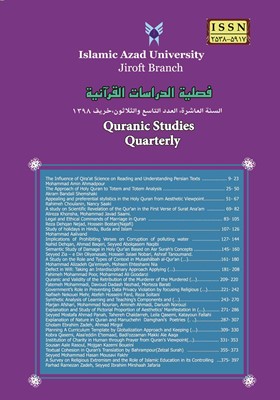Legal and Ethical Commands of Marriage in Quran
Subject Areas : Quarterly Sabzevaran FadakReza Dehqan Nejad 1 , Hossein Bostan (Najafi) 2
1 - Assistant Professor, Islamic Law & Jurisprudence, Shahid Madani University, Azerbaijan
2 - Assistant Professor, Social Scieneces, University & Hawzeh Research Center
Keywords: تعدد زوجات, Polygamy, محرمیت, کفویت, تجردگزینی, قواعد همسرگزینی, being single, marriage rules,
Abstract :
The present article studies Qur'an's viewpoint on some of key issues in the field of marriage by analyzing the content of relevant Verses by applying opinions of interpreters, especially Shiite interpreters. Findings of descriptive-analytical study show that Holy Quran implies absolute desirability and redemption of marriage because of its vital role. The Qur'an's supportive pattern of divorced women also reflects the same emphasis on marriage (and not remaining single). Qur'an's tone on polygamy is not hortatory and encouraging, but merely an expression of its permissibility. The purpose of Quran in knowing polygamy and temporary marriages formal, is to provide a solution to some of the social needs. What is emphasized in Holy Qur'an on main criteria of marriage is the necessity of being in the same dignity (for couples). Holy Qur'an also determines specific criterion for marriage and the role of women in marriage highlighting Divine Book's attention to the legal and ethical rules and commands of marriage as well as its social functions including expanding social interactions, maintaining women's respect and character and children education.
قرآن کریم.
کتب فارسی
امام خمینی، سید روح الله. بی تا، تحریر الوسیله، قم: مؤسسة مطبوعاتی دار العلم.
بستان(نجفی)، حسین. 1390ش، جامعهشناسی خانواده با نگاهی به منابع اسلامی، چاپ اول، قم: پژوهشگاه حوزه و دانشگاه.
ساروخانی، باقر. 1370ش، مقدمهای بر جامعهشناسی خانواده، تهران: سروش.
ساروخانی، باقر. 1389ش، مقدمهای بر جامعهشناسی خانواده، چاپ سیزدهم، تهران: سروش.
مطهری، مرتضی. 1385ش، نظام حقوق زن در اسلام، چاپ چهل و سوم، تهران: انتشارات صدرا.
مکارم شیرازی، ناصر و همکاران. 1374ش، تفسیر نمونه، تهران: دار الکتب الإسلامیة.
کتب عربی
ابن هشام الحمیری، عبد الملک. 1383ش، السیرة النبویة، 4 جلد، تحقیق محمد محیالدین عبدالحمید، القاهره: مکتبة محمد علی صبیح و اولاده.
بلاغی نجفی، محمد جواد. 1420ق، آلاء الرحمن فی تفسیر القرآن، قم: بنیاد بعثت.
حر عاملی، محمد بن حسن. 1409ق، وسایل الشیعه، قم: مؤسسه آل البیت.
حلّی سیوری، مقداد بن عبدالله. 1419ق، کنز العرفان فی فقه القرآن، تهران: مجمع جهانی تقریب مذاهب اسلامی.
راغب اصفهانی، حسین بن محمد. 1412ق، المفردات فی غریب القرآن، چاپ اول، دمشق و بیروت: دارالعلم الدار الشامیة.
شهید اول، محمد بن مکی. 1410ق، اللمعة الدمشقیة فی فقه الإمامیة، در یک جلد، بیروت: دار التراث- الدار الإسلامیة.
شهید ثانی، زین الدین بن علی. 1410ق، الروضة البهیة فی شرح اللمعة الدمشقیة، قم: کتابفروشی داوری.
طباطبایی، سید محمد حسین. 1417ق، المیزان فی تفسیر القرآن، قم: دفتر انتشارات اسلامی جامعه مدرسین حوزه علمیه قم.
طبرسی، فضل بن حسن. 1372ش، مجمع البیان فی تفسیر القرآن، چاپ سوم، تهران: انتشارات ناصرخسرو.
طریحی، فخرالدین. 1375ش، مجمع البحرین، تهران: کتابفروشی مرتضوی.
طوسی، ابوجعفر محمد بن حسن. 1407ق، الخلاف، 6 جلد، قم: دفتر انتشارات اسلامی وابسته به جامعه مدرسین حوزه علمیه قم.
کرکی عاملی، علی بن حسین. 1414ق، جامع المقاصد فی شرح القواعد، 13 جلد، قم: مؤسسه آل البیت علیهم السلام.
کلینی، محمد بن یعقوب. 1365ش، الکافی، تهران: دار الکتب الاسلامیه.
مجلسی، محمدباقر. 1404ق، بحار الأنوار، بیروت: مؤسسة الوفاء.
نجفی، محمدحسن. 1404ق، جواهر الکلام فی شرح شرائع الإسلام، چاپ هفتم، بیروت: دار إحیاء التراث العربی.
نوری، میرزا حسین. 1408ق، مستدرک الوسایل، قم: مؤسسة آل البیت.
کتب انگلیسی
Ingoldsby, Born B., (2006), "Marital Structure", Ingoldsby and Smith (eds.), Families in Global and Multicultural Perspective, Thousand Oaks: Sage Publications, Inc.
_||_
Holy Quran
Persian sources:
Imam Khomeini, Seyyed Roohollah, (Bita), Tahrir Al-Vasyylah, Dar-ul-Alam Press Institute, Qom.
Bostan (Najafi), Hossein (2011), Family sociology, A Look at Islamic Resources , Research Institute of seminary and Universities, Qom, First edition.
Saroukhani, Baqir, (1991), Introduction to family sociology, Soroush press, Tehran.
Saroukhani, Baqir, (2010), introduction to family sociology, Soroush press, Tehran, 13th edition.
Motahari, Morteza (2006), Women's rights in Islam, Sadra presss, Tehran, 45th edition.
Makaram Shirazi, Naser et al. (1995), Tafsire Nemouneh, Dari Al-Ktabe Eslami, Tehran
Arabic sources:
Ibn Hisham al-Humiri, Abdul Malik, (2004), Al-Sireet al-Nabivyah, 4 vols, Research: Mohammad Mahdi-al-Din Abdul-Hamid, Mohammad Ali Sabih and Aladah's school, Al-Qaherah.
Rabbi Najafi, Mohammad Javad (1999), Al-Rahman Fe al-tafsir al-Quran, Be'sat Foundation, Qom.
Hor Ameli, Mohammad Ibn Hassan (1988), Al-Shiite instruments, Al-al-Bait Institute, Qom.
Hali Siveri, Moghadad Ibn Abdullah, (1998), Kenzo Al-Faran fi Al-Fegh Al-Quran, the International Assembly of Approaching to Islamic Religion, [Bija].
Ragheb Esfahani, Hussein Ibn Muhammad (1991), Almfrdat al-Qurib al-Quran, Dar al-'Alm al-Dār al-Shamīte, Damascus and Beirut, 1d edition.
First martyr, Mohammad bin Maki, (1988), Al-Lam'a al-Dushiqyat fi Al-Fegh Al-imamyet, in one volume, Dar al-Terat - Al-Dār al-Islamiyah, Beirut.
Second martyr, Zainaldin ibn Ali (1988), Al-Faza al-Babaee for the description of al-Lum'a al-Dushikyat, Davary bookstore, Qom.
Tabatabaei, Seyyed Mohammad Hossein, (1996), Al-Meizan fi Al-Tafsir Al-Quran, Islamic Book Publishing House of Qom Seminary Lecturers, Qom.
Tabarsi, Fazl Ibn Hasan, (1993), Majma Al-Bian fi Al-Tafsir Al-Quran, Naser Khosrow press, Tehran, 3th edition.
Tarihi, Fakhredin, (1996), Majme Al-Bahrain, Mortazavi bookstore, Tehran
Tusi, Abu Jafar, Mohammad Ibn Hasan (1986), Al-Khelaf, 6 volumes, Islamic publishing office affiliated with the community of the teachers of Qom seminary, Qom.
Korki Ameli, Ali ibn Husain, (1993), Jame Al-Maqased fi Sharhe Al-Qawaed, 13 volumes, Al-Alibat Institute, Qom.
Koleiny, Mohammad bin Yaghoub (1986), Al-Kafi, Dar al-Ketab Al-eslamyyeh, Tehran.
Majlesi, Mohammad Bagher, (1983), Boharalanwar, the Al-Wafa Institute, Beirut.
Najafi, Mohammad Hassan, (1983)n, Jawahar al-Klamfi Sharh Al- Shirat al-Islāma, Dari إAhia Al-Trath Al-Arabi, Beirut, 7th edition
Nouri, Mirza Hussein (1408 AH), Mustardak Al-Vasyleh, Ale-Al-Bait Institute, Qom.


